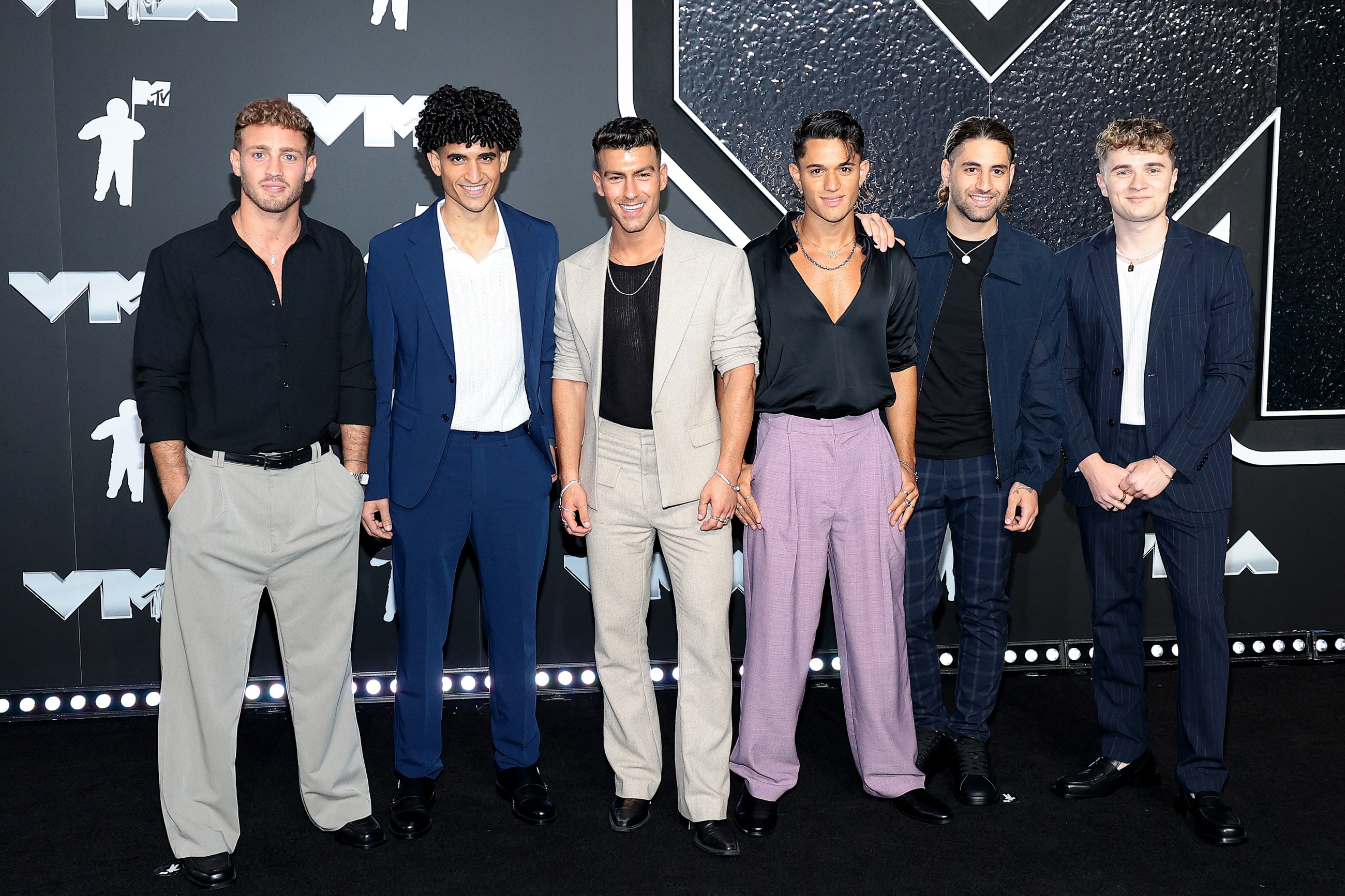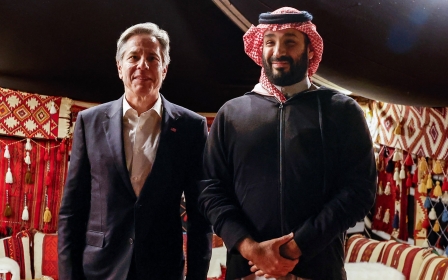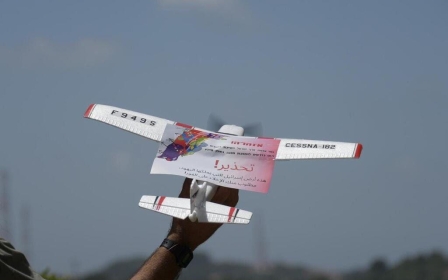‘Wrong direction’: Israeli-Palestinian boy band as1one met with outrage

There’s a new boy band on the scene - but it has been met with a frosty reception from social media users.
Dubbed as the “world’s first Israeli-Palestinian pop group”, the band as1one consists of four Israeli and two Palestinian musicians and released its debut single last month to mixed reactions from social media users.
Some questioned the timing of the release, as Israel’s assault on the Gaza Strip approaches one year and ahead of fears of a full-blown ground incursion in Lebanon.
“This is a disgusting PR stunt, especially considering what’s happening in Gaza and the West Bank,” wrote one Redditor.
Among the reactions were those dismissing the song as propaganda, promoting shallow understandings of peace and unity, and those arguing that the aim behind its release was to distract from Israel’s war on Gaza.
New MEE newsletter: Jerusalem Dispatch
Sign up to get the latest insights and analysis on Israel-Palestine, alongside Turkey Unpacked and other MEE newsletters
“Good try trying to distract from the genocide,” commented one user on Instagram, questioning the band’s goal of sending a message of unity at a time when Israel’s war on Gaza has killed over 41,500 Palestinians.
Whenever Israelis do this shit, it's always the most artificial and hollow presentation imaginable. Nothing about this group is organic or sincere. They were created by two rich American record execs who held nationwide auditions where they hand picked each member. It's a grift. https://t.co/o16qreWQg1
— barry with the NED (@bonzerbarry) September 26, 2024
“I don't have a problem with the ‘diversity’ of the boy band,” another commented. “I have a problem with it being the boy band's branding.
"For me, true coexistence speaks for itself. It does not need to be bragged about and it certainly won't be monetised from.”
Others took a more humorous approach.
“Wrong direction,” some posted, playing on the name of the popular English-Irish pop band, One Direction.
Delete this. All of it. The whole thing.
— Jared's Thumbs 🇵🇸🇺🇦 (@jaredsthumbs) September 26, 2024
“The cia is getting creative,” joked another.
worst possible CIA propaganda I've seen in a while
— Will Brown (@W1ll_98) September 28, 2024
As1one - pronounced “as one” - was brought together by American music executives James Diener and Ken Levitan, known for developing popular bands Maroon 5 and Kings Of Leon. They wanted to create an “Israeli version” of the wildly popular Korean pop band BTS with the aim of replicating its success.
They held auditions across Israel in 2021, with the duo citing logistical difficulties in choosing not to cast from the occupied West Bank and Gaza, the latter which has been under siege since 2007.
What in the hummus is this?
— AHMED | أحمد (@ASE) September 26, 2024
So now the CIA is Lou Pearlmaning? https://t.co/GustFs1rvF
But while press statements have centred around the group being “Israel’s take on BTS or One Direction” and hopes the group could prove to be a “natural inspiration in current times”, social media users have slammed it as disconnected from reality and attempting to paint a rosy picture of unity by virtue of its members’ identities.
The boyband as1one is an example of what BDS calls ‘normalisation’. Acting like ‘Israel’ and Palestine are two equivalent legitimate states that can come together peacefully through the arts. As opposed to one being a settler colony occupying the other and committing genocide.
— we keep us safe (@pleather_trash) September 26, 2024
The band consists of group members Ohad Attia and Neta Rozenblat, both Jewish Israelis from Tel Aviv; Sadik Dogosh, a Palestinian Bedouin Muslim from Rahat; Palestinian Christian Aseel Farah from Haifa; and Jewish Israelis Niv Lin and Nadav Philips.
Speaking to American entertainment magazine Billboard last month, Attia said: “We are here to make music and unite people.
“It doesn’t matter where you are from, what your background is or your beliefs are. We can like the same music and get joy from the same song.”
Philips added: “We are really here to make music that can bring people together. This is what it’s all about. This is what we came to do.”
But many social media users remained sceptical.
“The boy band as1one is an example of what BDS [Boycott-Divest-Sanctions movement] calls ‘normalisation,’” said one user.
“Acting like ‘Israel’ and Palestine are two equivalent legitimate states that can come together peacefully through the arts. As opposed to one being a settler colony occupying the other and committing genocide,” they continued.
MEE has reached out to the band for comment.
‘Eyes away from Rafah’
Several users highlighted the similarity of the title of the group’s debut track, "All eyes on us," released in collaboration with music legend Nile Rodgers, with slogans calling for attention to the plight of Palestinians.
The phrase "All eyes on Rafah" went viral in May when an image with the slogan stacked a whopping 40 million shares on Instagram in a day following widespread condemnation of what has come to be known as the Rafah massacre, where Israeli forces struck a tent camp housing displaced Palestinians in the southernmost city in Gaza, killing at least 45 people - mainly women and children - and wounding dozens of others.
“All eyes on us? Seriously?” one user questioned on YouTube as others argued the focus should be redirected to Gaza.
I think naming their song “all eyes on us” is such an evil and wicked thing to do especially after the rafah attacks and the spreading of the phrase “all eyes on rafah”
— Swapilla 🇵🇸 (@swapilla) September 26, 2024
“Calling the song ‘All Eyes On Us’ is absolutely calculated,” commented one Reddit user, with another saying: “This is a disgusting PR stunt, especially considering what’s happening in Gaza and the West Bank.”
“Eyes away from Rafah,” posted one user on X, formerly Twitter.
I've always admired Nile Rodgers but participating in a PR stunt on behalf of a regime conducting genocide is utterly repugnant.
— Tony Pizza (@chipslasagne2) September 26, 2024
“Calling it 'All eyes on us' is so devious if you tried googling all eyes on Gaza/Rafah,” shared another
While many have criticised the song title choice, some have argued that perhaps it was done to reaffirm the band members' presence and existence.
“I’m guessing it's on purpose, a call for peace, a call to 'pay attention we're here!', a call for unity and an understanding that at the end of the day we're cousins. It doesn't matter if you agree or not, that's what they say. Exactly because of the unpleasant reference,” responded one user.
Others argued that as people directly impacted by the conflict, the band are free to express themselves the way they choose to.
The war, now approaching its one-year mark, has turned much of Gaza into an uninhabitable hellscape.
Whole neighbourhoods have been erased. Homes, schools and hospitals have been devastated by air strikes and scorched by tank fire.
Almost the entire population are reported to have fled their homes, and those remaining in northern Gaza are on the verge of famine.
Middle East Eye delivers independent and unrivalled coverage and analysis of the Middle East, North Africa and beyond. To learn more about republishing this content and the associated fees, please fill out this form. More about MEE can be found here.




